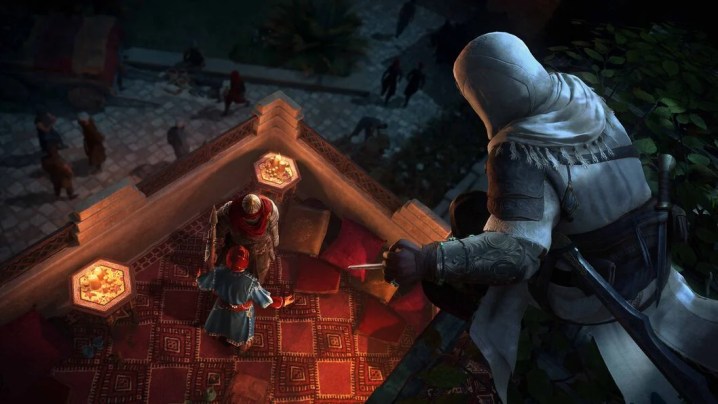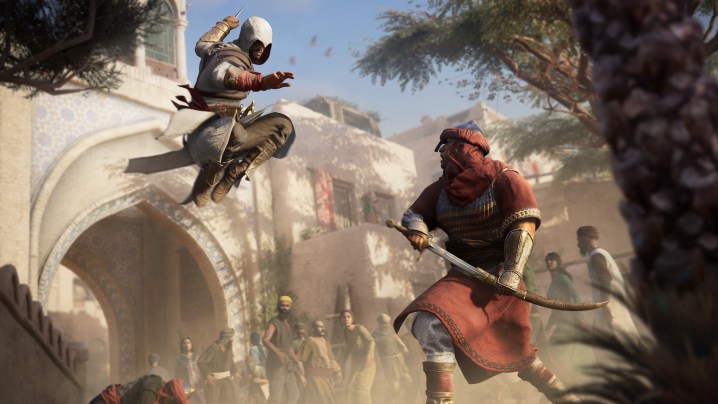“Assassin's Creed Mirage is a perfectly enjoyable stealth adventure, but it's not the leap of faith the series desperately needs.”
- Baghdad is a highlight
- Great lead performances
- Strong stealth
- Illusory nonlinearity
- Dated mission design
- Lackluster combat
As assassin-in-training Basim works to become a Hidden One toward the start of Assassin’s Creed Mirage, he’s scolded by his mentor, Roshan. After asking Basim to make a leap of faith into a pile of leaves, Roshan says it’s clear that Basim’s mind isn’t fully committed. Although Basim is eventually able to overcome this throughout the opening and the entirety of the adventure, Assassin’s Creed Mirage as a whole suffers a similar crisis.
Any long-running series like Assassin’s Creed needs to keep things fresh. In 2017, Assassin’s Creed Origins served as the start of a new era for the series that shifted its focus to historically educational RPGs in bold new settings. But that approach eventually got stale, and now it’s on Ubisoft to evolve the series yet again. With Mirage, Ubisoft aims to accomplish that by closely copying the formula of the pre-Origins games in the series while implementing a few tweaks to make missions more nonlinear. Unfortunately, that approach forgets why people wanted the Assassin’s Creed series to change in the first place.
At first, Assassin’s Creed Mirage seems like it’s going through all of the proper classical motions of an old-school Assassin’s Creed game, but it lacks the passion and innovation necessary to make it a truly memorable installment. While Ubisoft’s ability to create historical locations in immaculate detail is still unmatched, the bland story and missions demonstrate that Assassin’s Creed still needs to make a true leap of faith.
Beautiful Baghdad
Assassin’s Creed Mirage follows the origin story of Basim, a supporting character in 2020’s Assassin’s Creed Valhalla. It’s a rags-to-riches self-discovery story set in ninth-century Baghdad about a street thief desperate to find great purpose with the Hidden Ones. While that might be an enticing premise for fans of Valhalla, the narrative as a whole isn’t too interesting — especially if you know a lot about Basim already. Although Lee Majdoub (Basim) and Roshan actress Shohreh Aghdashloo give excellent performances, the rest of Mirage’s characters are forgettable, including the Templar targets who are supposed to make for memorable assassinations. Even the cinematography and cutscenes feel like they’re going through the motions.
An underwhelming story pressures other aspects of the game to deliver.
Basim’s journey of self-discovery and Roshan’s role as an overprotective master hit all of the expected story beats for those archetypes. Some late-game twists attempt to make the narrative more engaging, but are very confusing unless you deeply understand Assassin’s Creed lore. This isn’t a bold storytelling leap for the series like Origins was, and it almost entirely ignores the modern-day story thread that makes the series so unique.
An underwhelming story pressures other aspects of the game to deliver. Thankfully, the world design and educational elements of Mirage do just that. Baghdad and its surrounding desert are realized in stunning detail; I love walking around the streets or riding on a mount in cinematic mode. It’s a city that feels historically accurate and aptly dense ,yet still has some sort of parkour pathway for players to follow no matter which direction they decide to run in. A dynamic notoriety system, which increases the amount of patrolling enemies as Basim causes more chaos, also helps the world feel more lively.

Historically accurate, yet gamified world design has always been a part of the Assassin’s Creed’s core identity and was not something that needed to change, so it’s good to see Ubisoft at the top of its game here. Although the lack of a Discovery Tour mode at launch is disappointing, Historical Sites throughout Baghdad feature collectibles that unlock History of Baghdad codex entries, which are entertaining and informative reads.
Sneaking like it’s 2007
If you played any Assassin’s Creed game between 2007 and 2015, you’ll know what to expect from Mirage. It’s an open-world game stuffed with collectibles that players can search for between missions where the main goal is to investigate, stalk, and then kill targets. I appreciate that this approach means there is an emphasis on stealth rather than bloated RPG elements, even if combat here isn’t as fun as it was in some previous entries. Players are able to parkour around almost all of the buildings in Baghdad, and the controls feel intuitive, as there’s always something for Basim to latch on to as long as you’re pressing forward and tapping the A button. That’s part of Assassin’s Creed’s core identity that has never needed to change. Mirage recognizes that.
The stealth-to-combat gameplay loop will have its nostalgic fans, but it feels dated in 2023.
The freedom of parkour is important as it opens up more opportunities for stealth. In main missions and side contracts, players often have a certain target that they need to take out of a group of enemies to pick off. While recent Assassin’s Creed titles leaned more toward players overcoming these obstacles by taking on foes head-on, Mirage encourages stealth. Before any fight, I always use Basim’s Eagle Sense and bird companion Enkidu to scout out how many enemies are in a location and where. Then, I parkour on the rooftops around them or hide in tall grass so I can sneak up close and kill them. One of Mirage‘s most satisfying new gameplay elements is the Assassin’s Focus ability, which allows Basim to take out up to five enemies in one fell swoop. It’s almost a superpower.
There are opportunities for Basim to wear disguises or use tokens (earned from side missions) to convince certain factions to attack enemies. These tools never feel as useful as picking off enemies one by one, just as players have been able to since the first Assassin’s Creed in 2007. While it’s possible to complete most missions without being seen, I was still spotted at times. In those moments, I had to choose to run away or fight head-on. Mirage‘s combat, unfortunately, is a step back from the modern games in that regard. Basim is slow, controller bumpers don’t feel great to use as attack buttons, and the window where I have to choose to parry or dodge an incoming attack feels way too short.

While some of Mirage‘s throwback elements work, combat is one element where I can feel why it was important for the series to move on. The stealth-to-combat gameplay loop will have its nostalgic fans, but it feels dated in 2023. If I ever do find myself yearning for the old-school Assassin’s Creed formula, I can just go back and play those older games.
Not really nonlinear
I’d hoped for a bit more originality from Mirage, but it’s newer ideas don’t always pan out. Take its commendable, but imperfect nonlinear gameplay approach. A kernel of an excellent idea for the future of the series is there, as Basim’s targets are laid out across an investigation board and players must discover clues to find them. This is only nonlinear in presentation, though; it’s just a fancy way to lay out the two or three tasks that I needed to do before a killer set piece. Assassinations never feel like an emergent player moment like it can in a game like Shadows of Doubt.
When it comes to specific objective locations, the map only marks their general area, not the exact placement. When introducing the significant assassination missions where Basim is assassinating members of the Templar Order, Mirage consistently highlights how there are usually multiple ways to complete objectives before sending him off to kill a target. This suggests that these assassinations would work like a mission in Hitman, but they lack that nonlinear depth and play quite traditionally. The only real difference now is that players must constantly use Eagle Vision to find precisely where objectives are rather than have a UI marker on the screen.
Assassinations never feels like an emergent player moment …
Most of the time, I only found alternate pathways into the area where I could do the linear infiltration and assassination gameplay the series has done since 2007. Needing to put in a little more effort to find these by-the-numbers paths didn’t enhance these moments by much. Once you peel back any attempts at nonlinear play, Mirage is an action-adventure open-world game that feels stuck in 2015. The genre has made great strides since then, partly thanks to Assassin’s Creed titles, but Mirage feels behind the times. While there’s nothing explicitly terrible about Mirage’s design, I felt lethargic playing through stealth missions that ignored any improvements made to the genre over the past decade.

This formula rewind is great for fans who were missing that era and open-world formula, but boring for those like me who understand why it was time for Ubisoft to evolve that classic formula. I do see a future for the series where it embraces nonlinearity, hewing closer to series like Dishonored or Hitman in an intricately recreated historical setting. Unfortunately, the attempts toward that are held back by other extremely dated aspects of its design. Ubisoft is still a master at creating locations I want to explore, but it still needs to find new ways to make what I’m discovering more enticing.
While Ubisoft went through all the proper motions to make a new game in the old Assassin’s Creed style, it did so without much of an attempt to push the formula forward. Those yearning for the good old days might appreciate that, but it misses a chance for reinvention that other franchises have enjoyed in recent years. Series like The Legend of Zelda, Final Fantasy, and even Pokemon have found exciting ways to evolve. Even Assassin’s Creed has done this once before. Perhaps it’s time for Ubisoft to take another leap of faith and discover where Assassin’s Creed can go next.
Assassin’s Creed Mirage was reviewed on Xbox Series X.




